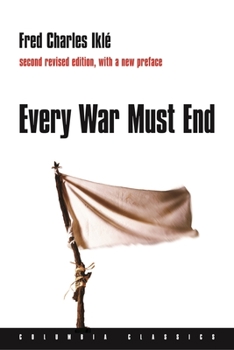Every War Must End
Select Format
Select Condition 
Book Overview
"Mission accomplished," George Bush famously proclaimed in reference to the defeat of Saddam Hussein's military organization. However, as recent events in Iraq have once again demonstrated, it is much easier to start a war than it is to end it.
Format:Paperback
Language:English
ISBN:0231136676
ISBN13:9780231136679
Release Date:January 2005
Publisher:Columbia University Press
Length:208 Pages
Weight:0.56 lbs.
Dimensions:0.4" x 5.6" x 8.3"
Grade Range:Postsecondary and higher
Customer Reviews
3 ratings
Excellent short-book analysis
Published by Thriftbooks.com User , 17 years ago
This short book is an outstanding analysis of how nations end wars, or accept peace. Ikle shows how governments often prefer obviously self-destructive courses rather then compromise peace terms. The problem is most acute when factional interests dominate strategy rather then a rational unitary interest. In such a circumstance, factions that benefit from continuing the war will accuse those pursuing peace of treason. Sadly, there is no equivalent derogatory word in English for those who pursue war to the detriment of their country. The book was first written in 1971, and most of the examples are from the two world wars. The work is still extremely relevant, and at 130 pages it's well worth the time. Highly recommended as a first book to read on ending war.
Why aren't people reading this and discussing it?
Published by Thriftbooks.com User , 17 years ago
This book should be read by everybody on any side of the current debate as to what are future Iraq (Iran?, N. Korea?- w/ the current set of maroons you never know) policy should be. Ikle was Undersecretary of Defense for the Reagan administration. He is one of the original neocons. This book had an enormous influence on how Bush I and Powell decided to end our first Gulf War. He revised this book in 1991 and revised it again and wrote a new intro in 2005. My point is that this man is no cut and run liberal (and I should admit that, right now, I am leaning toward just that position). However, what makes Ikle stand out from his demented neocon brethren is that he is willing to face up to ALL of the possibilities, the difficulties and the ambiguities that are inherent in any foreign policy, let alone a war. He mentions many of the wars and theatres of those wars in the twentiety century and points out how many times politicians and generals went wrong because they would not 1. clearly set out the goals they were trying to accomplish in a war and 2. constantly reevaluate those goals in light of the developing situation. Ikle outlines a few of the difficulties that are obstacles to such a course. Rather prophetically, he talks about how difficult it is to get good intelligence to base your policies on. Sources from within the country of your opponent may mislead you for their own purposes. Agencies within your own government are posturing with the intelligence to protect their influence. Does any of this sound familiar? In one of my favorite chapters of this book, Ikle talks about a tendency that occurs when things start to get difficult in a war. Those who are supporters of the war will start posturing as patriots and referring to the opponents of the war as traitors (or, in the parlance of the editorial page of the Wall Street Journal, as "surrender monkeys"). Again does this sound at all familiar? Here is another one for ya. Ilke argues that it is essential to know why exactly you are fighting. Otherwise, you will never really know when you have won. It is very clear that the whole WMD was just what Rumsfeld or Cheney (I have forgotten which- neither one of them has said anything about the war that is worth remembering in a positive sense) said it was-the one justification they "could all agree on." The role of America as the Great Democratizer has faded into memory. Now we are left with The MisDecider telling us that it is all about leaving Iraq with "a viable government" What does that mean? How is that different from what they had under Sadam? Here is my main point. Here is what makes me so angry. Powell, Rumsfeld, and Cheney all read this book back before the first Gulf War. Nothing has changed in the world to make the recommendations of this book any less vital. These men and women were supposed to be the most experienced foreign and military people the Republicans had produced (which should blow all claims to the Republicans being the party
It's How Wars End That Become Important Afterward
Published by Thriftbooks.com User , 19 years ago
The twentiety century taught us a lot about wars and how they end. World War I showed us that making strong demands on the defeated (who didn't admit defeat to their own people) set the stage for the next big war. World War II was fought until the Unconditional Surrender of the Germans and Japanese. Something that thinkers still debate as having made them fight all that harder. VietNam was fought with no clear end in sight, and "another VietNam" entered our language. The first Gulf War was ended when Colin Powell and Bush II debated how to end the war. They stopped before they had to go in and see what the Sunni's, Shiite's and Kurds made of the power vacuum left by the removal of Saddam would have created. Bush II is learning about this now. This is the second revised edition of this book, originally published in 1971 and then updated in 1991 and now 2005 to reflect happenings in new wars. Still some of the old wars had interesting insights that I didn't know before, such as how Finland, originally on Germany's side against Russia, made a peace with Russia and kicked the Germans out before they became a Russian province. Great Book.





